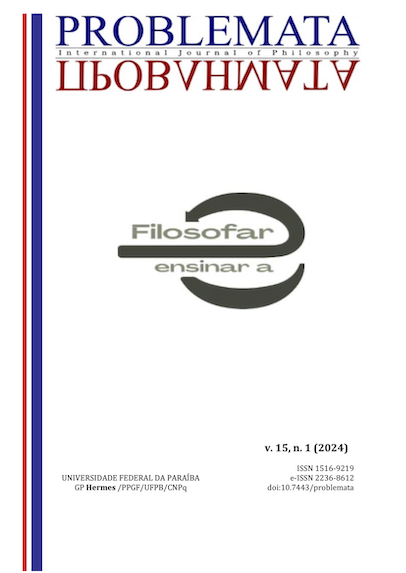SOCIO-EMOTIONAL COMPETENCIES AND PHILOSOPHY TEACHING:
POSSIBILITIES AND PERSPECTIVES
DOI:
https://doi.org/10.7443/problemata.v15i1.70244Keywords:
Socio-emotional Skills, Philosophy Teaching, New SchoolAbstract
In this article, I try to situate socio-emotional competences, as they are mentioned in the National Common Curriculum Base (BNCC), in the midst of the two antagonistic perspectives that discuss them in the contemporary debate: the critical perspective coming from dialectical historical materialism and the conception in favor of such competences whose origins go back to the New School. I set out this contrast in order to understand whether socio-emotional competences are merely a mechanism for coercion and consensus in the face of transformations in the world of work, as the critical conception indicates, or whether they can enable a gain in language with regard to the affective dimension, which is so unheard of in the usual education system. Philosophy, in turn, was still understood in ancient times as a thought capable of changing the way of being and acting of the individual who comes into contact with it. It is therefore worth questioning the ways in which this discipline can relate to socio-emotional competences from a critical perspective, aligned with the aim of contributing to the formation of subjects who are attitudinally capable of going beyond self-interest in favor of defending and caring for a shared world.
Downloads
References
ACCYOLI, Inny. As Competências Socioemocionais na formação da juventude: mecanismo de coerção e consenso frente às transformações no mundo do trabalho e ao conflitos sociais no Brasil. Rio de Janeiro: Vértices, 2021.
ALTHUSSER, Louis. Aparelhos ideológicos do estado. Rio de Janeiro: Edições Geral, 1985.
AZEVEDO, F. et al. Manifesto dos pioneiros da Educação Nova (1932) e dos educadores (1959). Recife: Fundação Joaquim Nabuco, Editora Massangana, 2010. v. 122.
BANCO INTERNACIONAL PARA RECONSTRUÇÃO E DESENVOLVIMENTO/BANCO MUNDIAL. Emprego e Crescimento: A agenda da produtividade. Washington, DC, 2018.
BANCO MUNDIAL. Relatório de Capital Humano Brasileiro: investindo nas pessoas. Washington, DC: 2022.
BRASIL. Ministério da Educação. Base Nacional Comum Curricular. Brasília, 2018.
CASEL atualiza sua concepção de aprendizagem socioemocional. Vila Educação, 2021. Disponível em: https://www.todamateria.com.br/referencia-site-abnt/ Acesso em: 03 jun. 2024.
DAMÁSIO, Antonio. O Erro de Descartes. São Paulo: Editora Econômica, 2012.
DESENVOLVENDO competências socioemocionais: entenda seu papel essencial na educação. Instituto Ayrton Senna. Disponível em: https://institutoayrtonsenna.org.br/competencias-socioemocionais/. Acesso em: 03 jun. 2024.
DUNKER, Christian; SAFATLE, Vladimir. Neoliberalismo como gestão do sofrimento psíquico. São Paulo: Autêntica, 2021.
FRASER, Nancy. Capitalismo em debate: uma conversa na teoria crítica. São Paulo: Editora Boitempo, 2020.
GARCEZ, Marina. Um mundo común. Barcelona: Edicion Bellaterra, 2013.
GOLEMAN, Daniel. Inteligência Emocional. São Paulo: Editora Objetiva, 2014.
HADOT, Pierre. Exercícios espirituais e filosofia Antiga. São Paulo: É Realizações, 2014.
HAN, Byung-Chul. A Sociedade do Cansaço. Petrópolis: Editora Vozes, 2015.
LAVAL, Christian; DARDOT, Pierre. A nova razão do mundo: ensaio sobre a sociedade neoliberal. São Paulo: Boitempo, 2016.
MASSCHELEIN, Jan; SIMONS, Maarten. Em defesa da escola: uma questão pública. São Paulo: Autêntica, 2013.
MENA, Fernanda. Oito em cada dez jovens tiveram problemas recentes de saúde mental. Folha de São Paulo. Disponível em: https://www1.folha.uol.com.br/equilibrio/2022/10/8-a-cada-10-jovens-tiveram-problemas-recentes-de-saude-mental-aponta-datafolha.shtml. Acesso em: 03 abr. 2024.
OECD. Social and Emotional Skills: Well-being connectedness and success. Directorate for Education and Skills. Paris: OECD Publishing, 2018.
OMS destaca necessidade urgente de transformar saúde mental e atenção. Organização Pan-Americana em Saúde. Disponível em: https://www.paho.org/pt/noticias/17-6-2022-oms-destaca-necessidade-urgente-transformar-saude-mental-e-atencao. Acesso em: 03 jun. 2024.
SAFATLE, Vladimir. O circuito de afetos: corpos políticos, desampara e o fim do indivíduo. São Paulo: Autêntica, 2016.
WEIL, Pierre; LELOUP, Yves. Normose: a patologia da normalidade. Petrópolis: Editora Vozes, 2014
ZABALA, Antoni; ARNAU, Laia. Métodos para ensinar competências. Porto Alegre: Penso, 2020.
Downloads
Published
Issue
Section
License
Copyright (c) 2024 Emiliano Kelm Duet Chagas

This work is licensed under a Creative Commons Attribution 4.0 International License.
Authors who publish with this journal agree to the following terms:
- Authors retain copyright and grant the journal right of first publication with the work simultaneously licensed under a Creative Commons Attribution License that allows others to share the work with an acknowledgement of the work's authorship and initial publication in this journal.
- Authors are able to enter into separate, additional contractual arrangements for the non-exclusive distribution of the journal's published version of the work (e.g., post it to an institutional repository or publish it in a book), with an acknowledgement of its initial publication in this journal.
-
- Authors are permitted and encouraged to post their work online (e.g., in institutional repositories or on their website) prior to and during the submission process, as it can lead to productive exchanges, as well as earlier and greater citation of published work (See The Effect of Open Access).





